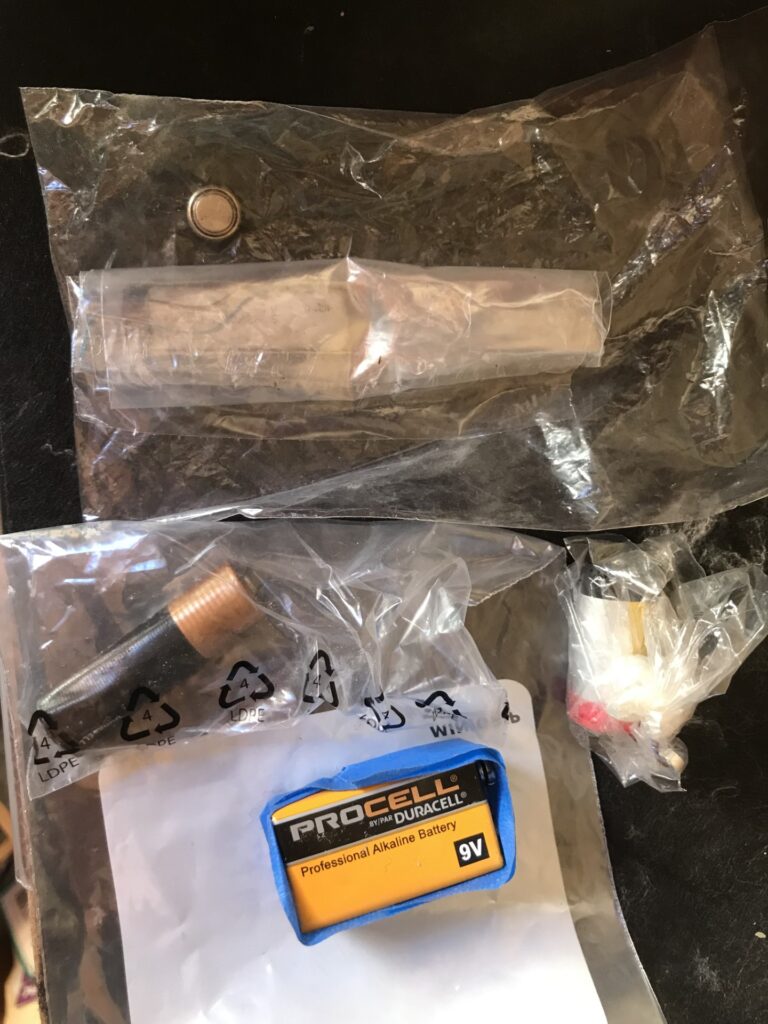Every day, we use devices powered by batteries – and these batteries contain hazardous materials. This article reviews how Acton residents can dispose of used batteries safely right here in town – and why it is important to do so.
Batteries in our devices contain a variety of hazardous materials: mobile phones (mostly lithium ion), car key fobs (manganese dioxide lithium buttons), television remote controls (alkaline AA’s and AAA’s), vaping equipment (primary lithium), and hundreds of other handhelds. Larger rechargeable batteries weighing up to twenty-five pounds run tools and landscape maintenance equipment (nickel-cadmium or lithium ion) and personal mobility devices such as e-bikes and scooters (lithium-ion). Home computer networks use batteries such as those for Verizon FIOS systems (sealed lead-acid). Regardless of the chemistry they use, batteries can create dangers for producers, consumers, firefighters, waste facility staff, and the environment, and should be recycled or discarded separately from regular municipal solid waste.

Fire is the principal hazard if batteries are discarded improperly. Lithium batteries need especially careful disposal because they can create extremely persistent and hot fires (close to 1,000º F). Over the past few years, lithium battery fires have ravaged disposal facilities such as Waste Management in Avon, Resource Waste in Boston, and Reworld’s SEMass facility in Rochester. In a recent conversation, Acton Fire Chief Anita Arnum reported two Acton battery fires in the past three years. Both fires resulted from improper storage of spent batteries,in one case after replacement of smoke detector batteries in a large apartment building. With their parallel terminals on top, 9-volt batteries that are partly but not fully discharged can complete a circuit by coming in contact with another battery’s terminals or a conductive metal object. This can create a runaway thermal reaction. See this article about a house fire in New Hampshire reportedly caused by loose 9-volt batteries. It is important to bag up or tape battery terminals to prevent short circuits to avoid such fires.
Recycling batteries properly can not only prevent fires, but it can also help reduce the social and environmental costs of extracting the minerals used in their original manufacture. Mining metals like lithium, cobalt, cadmium, manganese and rare-earth elements used in batteries spoils the environment and creates hazards for workers in the Democratic Republic of the Congo, Bolivia, and elsewhere. If batteries are discarded to Acton’s trash, they are incinerated and their mineral components are concentrated in the ashes, which get landfilled. Toxins such as lead, lithium, zinc, manganese, and other battery metals can leach into groundwater eventually and pollute living things, including people, downstream.
How and where can Acton residents safely discard or recycle batteries? Here are some options, depending on type:
- Non-removable batteries embedded in electronic devices (e.g. laptops, portable speakers, electric toothbrushes): Recycle with other electronics at Acton Transfer Station, where a sticker is required (recycling only sticker is $20). If your trash is picked up by a private collection service, ask for recycling instructions from the company.
- Non-removable batteries in vaping devices: Return to vendor or take to Acton Household Hazardous Waste Days, usually in June and September.
- Ni-cads, buttons, lithiums: Acton Household Hazardous Waste Days, Acton Transfer Station office, Staples (Acton), Batteries Plus (Marlborough or Framingham).
- Alkalines: Staples, Batteries Plus.
- Lead: Acton Transfer Station ($5 fee will be charged).
Starting in the summer of 2024, the Acton Staples Store and many others across the nation began accepting all batteries under 25 pounds for recycling, including alkalines. Staples will award credits and discounts to battery recyclers through their “Easy Rewards” program. Staples sends the batteries they collect for recycling to Call2Recycle (C2R), a non-profit battery recovery company founded by a consortium of battery manufacturers. C2R recovers and recycles metals and plastic from these batteries in a safe manner fully compliant with all hazardous waste laws. C2R also sells home collection kits which include a pre-paid UPS shipping label.
Wherever batteries are recycled, residents can practice these measures to reduce fire risk:
- Store unused batteries in their original packaging, away from a heat source and in a well-ventilated space.
- Isolate spent battery terminals by taping over (end caps of AA’s and AAA’s and terminals of 9-volts and 12-volt lead batteries) or individually sealing in plastic bags.
- Consider getting a battery tester device or multi-meter to get full value from your batteries before recycling.
Many states and provinces (VT, NJ, IL, MO, CA, WA, Ont, Qc and others) now require manufacturers to take back all used batteries, including alkalines, at convenient point-of-sale or local hazardous waste drop-offs at no cost to taxpayers. Our state laws currently allow consumers to discard used alkaline batteries in the trash. The Massachusetts Product Stewardship Council is drafting proposed legislation for a comprehensive product stewardship legislation for batteries in Massachusetts. To learn more about product stewardship policies in our state and elsewhere, see the Product Stewardship Institute’s “Batteries” page here.
Rob Gogan is Chair of the Green Acton Materials Committee and a member of the Massachusetts Product Stewardship Council.
